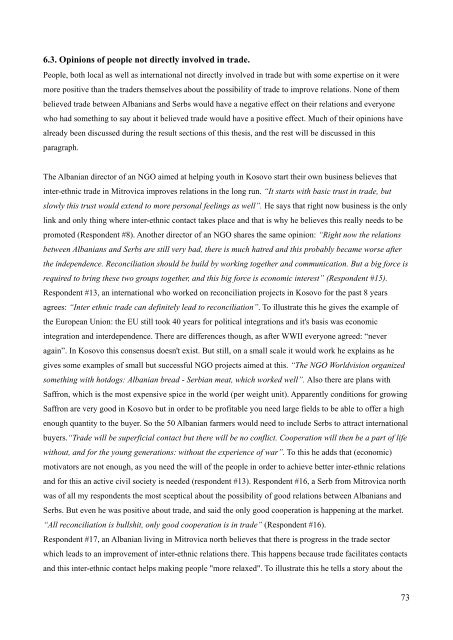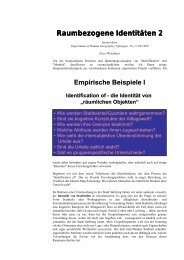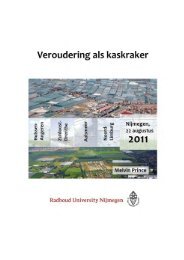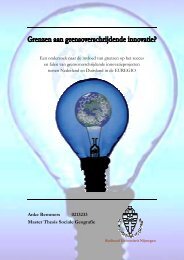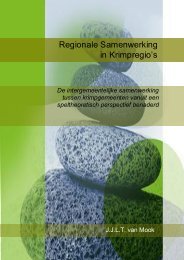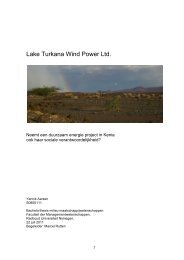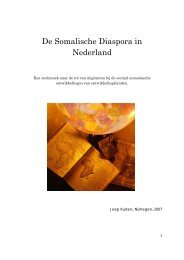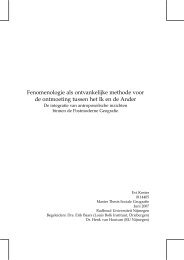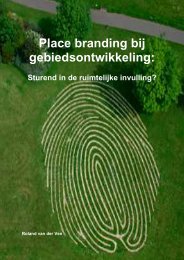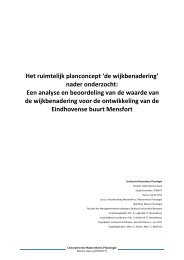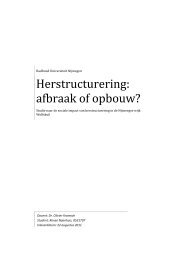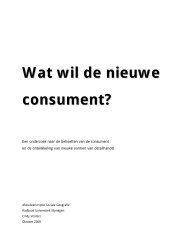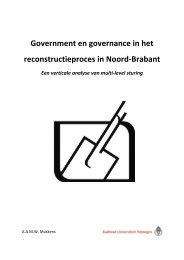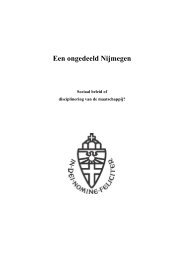Trading with the enemy in Mitrovica, Kosovo. - RUhosting
Trading with the enemy in Mitrovica, Kosovo. - RUhosting
Trading with the enemy in Mitrovica, Kosovo. - RUhosting
Create successful ePaper yourself
Turn your PDF publications into a flip-book with our unique Google optimized e-Paper software.
6.3. Op<strong>in</strong>ions of people not directly <strong>in</strong>volved <strong>in</strong> trade.<br />
People, both local as well as <strong>in</strong>ternational not directly <strong>in</strong>volved <strong>in</strong> trade but <strong>with</strong> some expertise on it were<br />
more positive than <strong>the</strong> traders <strong>the</strong>mselves about <strong>the</strong> possibility of trade to improve relations. None of <strong>the</strong>m<br />
believed trade between Albanians and Serbs would have a negative effect on <strong>the</strong>ir relations and everyone<br />
who had someth<strong>in</strong>g to say about it believed trade would have a positive effect. Much of <strong>the</strong>ir op<strong>in</strong>ions have<br />
already been discussed dur<strong>in</strong>g <strong>the</strong> result sections of this <strong>the</strong>sis, and <strong>the</strong> rest will be discussed <strong>in</strong> this<br />
paragraph.<br />
The Albanian director of an NGO aimed at help<strong>in</strong>g youth <strong>in</strong> <strong>Kosovo</strong> start <strong>the</strong>ir own bus<strong>in</strong>ess believes that<br />
<strong>in</strong>ter-ethnic trade <strong>in</strong> <strong>Mitrovica</strong> improves relations <strong>in</strong> <strong>the</strong> long run. “It starts <strong>with</strong> basic trust <strong>in</strong> trade, but<br />
slowly this trust would extend to more personal feel<strong>in</strong>gs as well”. He says that right now bus<strong>in</strong>ess is <strong>the</strong> only<br />
l<strong>in</strong>k and only th<strong>in</strong>g where <strong>in</strong>ter-ethnic contact takes place and that is why he believes this really needs to be<br />
promoted (Respondent #8). Ano<strong>the</strong>r director of an NGO shares <strong>the</strong> same op<strong>in</strong>ion: “Right now <strong>the</strong> relations<br />
between Albanians and Serbs are still very bad, <strong>the</strong>re is much hatred and this probably became worse after<br />
<strong>the</strong> <strong>in</strong>dependence. Reconciliation should be build by work<strong>in</strong>g toge<strong>the</strong>r and communication. But a big force is<br />
required to br<strong>in</strong>g <strong>the</strong>se two groups toge<strong>the</strong>r, and this big force is economic <strong>in</strong>terest” (Respondent #15).<br />
Respondent #13, an <strong>in</strong>ternational who worked on reconciliation projects <strong>in</strong> <strong>Kosovo</strong> for <strong>the</strong> past 8 years<br />
agrees: “Inter ethnic trade can def<strong>in</strong>itely lead to reconciliation”. To illustrate this he gives <strong>the</strong> example of<br />
<strong>the</strong> European Union: <strong>the</strong> EU still took 40 years for political <strong>in</strong>tegrations and it's basis was economic<br />
<strong>in</strong>tegration and <strong>in</strong>terdependence. There are differences though, as after WWII everyone agreed: “never<br />
aga<strong>in</strong>”. In <strong>Kosovo</strong> this consensus doesn't exist. But still, on a small scale it would work he expla<strong>in</strong>s as he<br />
gives some examples of small but successful NGO projects aimed at this. “The NGO Worldvision organized<br />
someth<strong>in</strong>g <strong>with</strong> hotdogs: Albanian bread - Serbian meat, which worked well”. Also <strong>the</strong>re are plans <strong>with</strong><br />
Saffron, which is <strong>the</strong> most expensive spice <strong>in</strong> <strong>the</strong> world (per weight unit). Apparently conditions for grow<strong>in</strong>g<br />
Saffron are very good <strong>in</strong> <strong>Kosovo</strong> but <strong>in</strong> order to be profitable you need large fields to be able to offer a high<br />
enough quantity to <strong>the</strong> buyer. So <strong>the</strong> 50 Albanian farmers would need to <strong>in</strong>clude Serbs to attract <strong>in</strong>ternational<br />
buyers.“Trade will be superficial contact but <strong>the</strong>re will be no conflict. Cooperation will <strong>the</strong>n be a part of life<br />
<strong>with</strong>out, and for <strong>the</strong> young generations: <strong>with</strong>out <strong>the</strong> experience of war”. To this he adds that (economic)<br />
motivators are not enough, as you need <strong>the</strong> will of <strong>the</strong> people <strong>in</strong> order to achieve better <strong>in</strong>ter-ethnic relations<br />
and for this an active civil society is needed (respondent #13). Respondent #16, a Serb from <strong>Mitrovica</strong> north<br />
was of all my respondents <strong>the</strong> most sceptical about <strong>the</strong> possibility of good relations between Albanians and<br />
Serbs. But even he was positive about trade, and said <strong>the</strong> only good cooperation is happen<strong>in</strong>g at <strong>the</strong> market.<br />
“All reconciliation is bullshit, only good cooperation is <strong>in</strong> trade” (Respondent #16).<br />
Respondent #17, an Albanian liv<strong>in</strong>g <strong>in</strong> <strong>Mitrovica</strong> north believes that <strong>the</strong>re is progress <strong>in</strong> <strong>the</strong> trade sector<br />
which leads to an improvement of <strong>in</strong>ter-ethnic relations <strong>the</strong>re. This happens because trade facilitates contacts<br />
and this <strong>in</strong>ter-ethnic contact helps mak<strong>in</strong>g people "more relaxed". To illustrate this he tells a story about <strong>the</strong><br />
73


